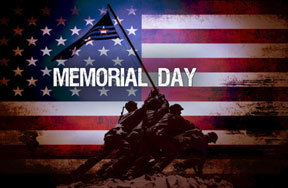Looking for May Holidays? Here's a brief history of May Day, Cinco de Mayo, Mother's Day, Victoria Day and Memorial Day.
May Day - May 1st
May Day was first celebrated hundreds of years ago by Pagans as a holiday to welcome spring. It wasn't until the late 1800s that May Day's focus changed from a festival of spring to a day to honor the working man. In Europe, China and other parts of the world, May 1st is Labor Day. Since North America already has a Labor Day in September, it continues to see May Day as a symbol of spring.
 May Holidays
May Holidays
Cinco de Mayo - May 5th
Cinco de Mayo is a proud day for Mexicans who celebrate the victory over the French at the battle of Pueblo on May 5, 1862. The French army was better armed and three times larger but the Mexican army still defeated them. Today there are parades, music and lots of celebrating!

Mother's Day - May 9th
Mothers are precious so it's not surprising that there's a special day set aside to make them feel special. Mother's Day has been around for many years. In the 1600s, England used to have a day called Mothering Sunday when servants had the day off to spend with their moms. In the US, both Julia Ward Howe and Anna Jarvis campaigned separately to start a day for Mothers. In 1914, Mother's Day became an official holiday thanks to these two women. Mother's Day falls on the second Sunday of May.
Victoria Day - May 24th
Wouldn't it be cool if you could get the day off school on your birthday? Queen Victoria's been dead for over 100 years but Canadians still celebrate her birthday. Victoria took over the throne when she was only 18 years old, after her uncle died. She was Queen of the United Kingdom and Ireland and Empress of India. She ruled until her death on January 22, 1901.

Memorial Day - May 31st
Americans celebrate Memorial Day on the last Monday in May. Thousands of people celebrate this holiday, which goes back to the Civil War. In 1868, General John Logan made Memorial Day an official holiday to honor those who died in the Civil War. After World War I, the holiday was changed to honor all Americans who died fighting in any war, not just in the Civil War.

































